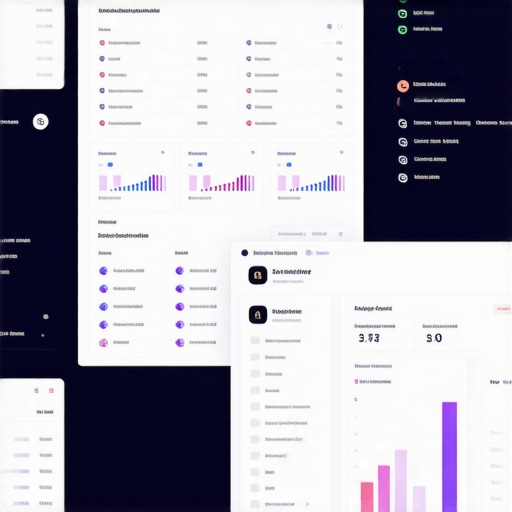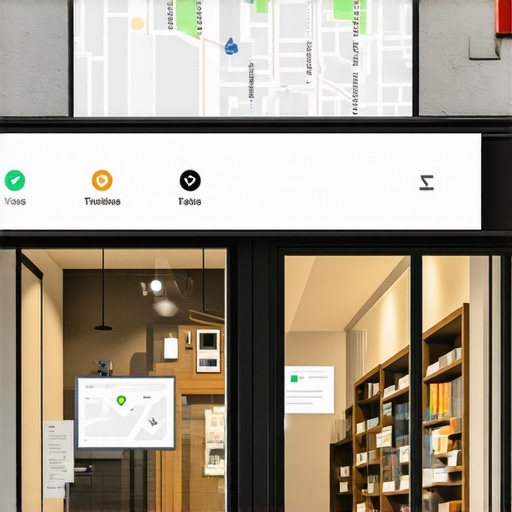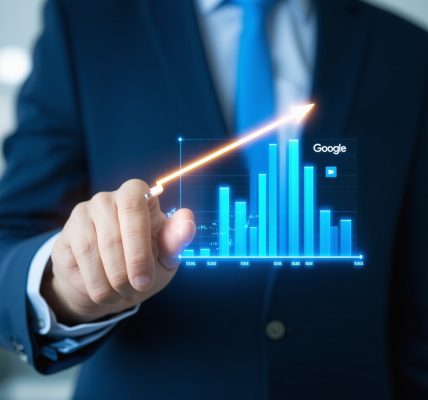Unveiling the Complexities of Google My Business SEO in 2025
In the rapidly evolving landscape of local search marketing, Google My Business SEO remains a cornerstone for small and large enterprises aiming to dominate their local markets. As we approach 2025, understanding the layered intricacies and advanced strategies that influence GMB rankings is essential for professionals seeking a competitive edge. This guide synthesizes expert insights, cutting-edge techniques, and emerging trends to elevate your local SEO game.
The Strategic Significance of Local Search Optimization
Local search optimization extends beyond mere keyword stuffing; it demands a nuanced approach integrating semantic relevance, user intent, and comprehensive local SEO tactics. The core challenge lies in aligning your GMB profile with evolving algorithmic signals, including voice search and AI-driven contextual understanding, which increasingly shape user interactions.
Advanced Techniques for GMB Profile Optimization
How can small businesses leverage niche-specific keywords to outrank competitors?
In-depth keyword research using tools like Google Keyword Planner, combined with localized semantic clusters, is vital. Incorporating long-tail keywords reflective of niche services or products enhances relevance. For example, a boutique hotel in Austin should optimize for keywords like “luxury boutique hotel in South Congress Austin” rather than generic terms. This precision boosts visibility in hyperlocal searches and reduces competition.
Moreover, optimizing GMB categories—by selecting the most relevant and less saturated options—can significantly improve ranking potential. Continuous profile updates, including content refreshes such as new photos, posts, and Q&A, signal activity and relevance to Google’s algorithms.
Integrating Citation and Review Strategies for Authority Building
Building authoritative citations and reviews remains fundamental. Expert consensus suggests that consistent NAP (Name, Address, Phone) data across high-trust directories, coupled with a proactive review acquisition strategy, enhances local ranking signals. Additionally, leveraging platforms like BrightLocal to streamline review management can accelerate credibility and visibility.
Technical Optimization: Beyond Surface-Level Tweaks
Technical SEO for GMB includes verifying all information, optimizing attributes, and ensuring fast load times for linked web assets. An often-overlooked aspect is schema markup: embedding localBusiness schema can help Google understand your profile contextually, improving chances of featured snippets and rich results.
Expert Insights and Emerging Trends
As noted by authoritative sources such as Moz and Search Engine Journal, Google Maps SEO will witness increased AI integration, making relevance and engagement metrics more impactful. Harnessing Google Posts, Q&A, and photo optimization can drastically influence local click-through rates.
What is the most effective way to adapt GMB strategies amid algorithmic volatility?
Continuous monitoring using tools like GMB Insights and staying abreast of algorithm updates from Google’s official channels is crucial. An adaptive, data-driven approach—combining real-time analytics with iterative optimization—ensures resilience and sustained visibility.
For those seeking to master the nuances of GMB SEO, exploring comprehensive expert resources can provide a strategic advantage. Additionally, sharing insights and case studies within professional communities fosters a collaborative atmosphere for innovative tactics.
If you’re eager to elevate your local search presence, consider consulting specialized GMB citation and review management services tailored for 2025 trends. This proactive stance positions your business at the forefront of local SEO excellence.
Innovative GMB Tactics: How Can Advanced Data Analytics Transform Your Local SEO?
In 2025, leveraging sophisticated data analytics tools can revolutionize your approach to Google My Business (GMB) optimization. By analyzing user behavior patterns, engagement metrics, and competitor performance, businesses can tailor their local SEO strategies with unprecedented precision. Tools like Google Analytics integrated with GMB insights enable marketers to identify high-converting keywords, optimal posting times, and content preferences, fostering a dynamic and responsive profile management process.
Moreover, predictive analytics can forecast local search trends, allowing proactive adjustments to your profile before changes occur. Incorporating machine learning models to interpret large datasets helps identify hidden opportunities and mitigate risks associated with algorithm fluctuations. For instance, analyzing search query clusters can reveal underserved niches, which, when targeted with optimized GMB content, can dramatically boost visibility.
Challenging Conventional Wisdom: Is Everything We Know About Reviews Still Valid?
Many assume that quantity of reviews is the primary driver of local rankings; however, emerging research suggests that review quality, relevance, and engagement level are equally, if not more, important. According to Moz’s recent analysis, reviews that incorporate specific keywords and detailed descriptions can enhance contextual relevance, aligning with Google’s evolving semantic understanding algorithms (Moz SEO Trends 2025). This shift underscores the importance of cultivating genuine, meaningful customer feedback rather than merely accumulating volume.
Implementing targeted review strategies, such as encouraging customers to mention specific services or keywords, can reinforce your topical authority and improve your chances of appearing in the coveted Google Maps local pack. Additionally, actively engaging with reviews through responses demonstrates responsiveness and boosts local user engagement signals, which are increasingly weighted in ranking algorithms.
What emerging tools and frameworks can help small businesses stay ahead in the fiercely competitive local search landscape?
Adopting comprehensive local SEO platforms like BrightLocal, SEMrush, or Whitespark can streamline citation management, review monitoring, and keyword tracking, providing a unified view of your profile’s health and opportunities. These tools incorporate AI-driven suggestions for content updates, backlink opportunities, and citation consistency checks, aligning with the latest Google algorithm priorities.
For a deeper understanding of how to integrate these technologies effectively, visit our guide on local SEO best practices. Staying informed about the latest developments and continuously refining your tactics ensures resilience against algorithm volatility and maximizes your local visibility.
If you’re eager to elevate your GMB game further, consider exploring expert citation and review services designed for 2025 trends. Sharing your insights or success stories in our community can inspire others and foster collaborative growth in local search mastery.
Harnessing Data-Driven Personalization to Elevate GMB Performance
In the quest for local SEO dominance, personalization driven by sophisticated data analytics is rapidly becoming the differentiator. Advanced tools like Google Analytics coupled with GMB insights enable businesses to craft hyper-targeted content, tailored offers, and customized user experiences. For instance, analyzing customer engagement patterns reveals peak interaction times, allowing businesses to schedule posts and updates during high-traffic periods, thereby maximizing visibility and engagement.
Furthermore, segmentation based on user demographics, behaviors, and preferences permits nuanced messaging strategies. For example, a local fitness center might identify that young professionals are more responsive to early morning promotions, prompting targeted campaigns that boost appointment bookings and community engagement. This personalized approach not only enhances user experience but also significantly improves conversion rates, reinforcing the importance of integrating advanced analytics into your local SEO toolkit.
Emerging Role of AI and Machine Learning in Local Search Optimization
Artificial intelligence (AI) and machine learning (ML) are revolutionizing local search algorithms, enabling Google to interpret local context with unprecedented accuracy. According to a comprehensive study by Search Engine Journal, AI-driven ranking signals now prioritize relevance and engagement metrics over traditional keyword density, emphasizing the need for authentic, user-centric content strategies (Search Engine Journal AI Trends).
Implementing AI-powered tools like chatbots for customer interaction or content generators for localized blogs can streamline operations and enhance profile relevance. For instance, an AI-driven review analysis system can automatically detect sentiment shifts and flag negative feedback for prompt response, thus safeguarding reputation and maintaining high ranking potential. As AI continues to evolve, staying at the forefront by experimenting with these technologies becomes essential for local SEO mastery.
What is the Impact of Hyperlocal Content Strategies on GMB Visibility?
Hyperlocal content, which focuses on very specific neighborhoods, landmarks, or community events, is increasingly vital for elevating GMB profile prominence. By integrating detailed, contextually rich information about local happenings through Google Posts, FAQs, and images, businesses can build a strong topical authority within their micro-communities. This targeted content not only attracts highly relevant local searches but also signals to Google that your profile is an authoritative source within your niche.
For example, a bakery situated near a popular park could regularly highlight local events, seasonal treats, or collaborations with neighborhood charities. Such content fosters community trust and encourages local backlinks, which are key ranking factors. Additionally, leveraging user-generated content and local stories enhances authenticity, further reinforcing your profile’s relevance and visibility in hyperlocal searches.
Advanced Techniques for Managing Local Citations and Reviews at Scale
As local SEO becomes more data-driven, managing citations and reviews at scale requires sophisticated tools and strategies. Platforms like Whitespark and BrightLocal offer automation features for continuous citation audits, NAP consistency checks, and review monitoring, ensuring your profile remains optimized amid a dynamic local landscape. Integrating these tools with CRM systems allows for personalized review solicitation campaigns, tailored to customer purchase history and satisfaction levels.
Moreover, employing sentiment analysis algorithms helps prioritize responses to reviews, focusing on those that influence perception and ranking the most. Developing a systematic review acquisition process—such as targeted email follow-ups or in-store prompts—can significantly improve review volume and quality, directly impacting your local search rankings. Regularly analyzing citation health and review metrics ensures your local presence remains resilient against algorithmic fluctuations and competitive pressures.
How Can Local SEO Professionals Prepare for the Next Generation of Search Engines?
Preparation for the future of local search entails embracing a holistic, integrated approach that combines technical excellence, rich content creation, and strategic data utilization. Staying updated through authoritative sources like Moz’s SEO Trends reports and Google’s official updates enables professionals to anticipate algorithm shifts and adapt proactively. Building a robust, scalable local SEO infrastructure—integrating schema markup, automation tools, and advanced analytics—creates a resilient foundation for ongoing success.
Furthermore, fostering community engagement through local events, partnerships, and social media amplifies your profile’s relevance and authority. As search engines become more context-aware and conversational, investing in high-quality, localized content that resonates with community values and interests will differentiate market leaders from laggards. For those committed to mastering next-generation local SEO, continuous learning and experimentation remain the keys to sustained dominance.
Unlocking the Power of AI-Driven Local Search Optimization
In the rapidly evolving realm of local SEO, harnessing artificial intelligence (AI) and machine learning (ML) is no longer optional but essential. Advanced AI algorithms analyze vast datasets to identify nuanced user intent and contextual relevance, enabling businesses to tailor their GMB profiles with pinpoint accuracy. Incorporating AI tools like chatbots for real-time customer engagement and content generators for hyperlocal blog posts significantly enhances relevance and user experience.
The Role of Hyperpersonalization in GMB Success
Hyperpersonalization leverages detailed user data, including behavioral patterns, demographics, and preferences, to craft highly targeted local content. For example, a boutique in Brooklyn can customize offers based on neighborhood events or local trends, making their GMB profile resonate more deeply with community members. Such tailored strategies foster loyalty and elevate visibility in competitive local searches, especially when combined with dynamic content updates.
How Can Advanced Data Analytics Refine Your Local SEO Approach?
Utilizing sophisticated analytics platforms like SEMrush, BrightLocal, and Tableau enables a granular understanding of local search performance. These tools help identify high-impact keywords, optimal posting times, and engagement drivers. By integrating predictive analytics, businesses can anticipate future search trends and adapt proactively, ensuring their GMB profiles remain ahead of the curve. This data-driven approach transforms reactive tactics into strategic, anticipatory actions.

What Are the Next Steps to Elevate Your Local Search Strategy in a Competitive Market?
To stay competitive, businesses must adopt an ecosystem approach—integrating real-time analytics, AI-powered tools, and community engagement initiatives. Continuous monitoring of GMB insights, combined with agile content strategies and reputation management, ensures resilience against algorithm updates and local market shifts. Building a comprehensive local SEO infrastructure rooted in data science empowers brands to dominate their niches sustainably.
For those eager to delve deeper into cutting-edge techniques, exploring authoritative resources like Moz’s SEO Trends 2025 report and Google’s official local search updates is recommended. Embracing innovation and fostering a culture of experimentation will be the hallmarks of successful local SEO professionals in the coming years.
Expert Insights & Advanced Considerations
1. Semantic Relevance Is Key to Future-Proof Rankings
Focusing on semantic relevance and user intent rather than solely keywords will become increasingly important. Integrating structured data and local context signals enhances profile accuracy and visibility.
2. Hyperlocal Content Drives Engagement and Authority
Develop hyperlocal content that reflects community events, landmarks, and neighborhood stories to establish authority within micro-communities and improve local search prominence.
3. AI-Driven Optimization Is Essential
Leverage AI tools for review sentiment analysis, predictive trend forecasting, and personalized content generation to stay ahead in the competitive local SEO landscape of 2025.
4. Data Analytics Enables Precise Strategy Refinement
Utilize advanced analytics platforms like SEMrush and Tableau to identify high-impact keywords, optimal posting times, and audience preferences, making your GMB strategy more responsive and effective.
5. Reputation Management Is More Critical Than Ever
Focus on generating high-quality reviews with relevant keywords and engaging responses to build trust and relevance, which are key ranking factors in the evolving algorithms.
Curated Expert Resources
- Google’s Official Local Search Updates: Stay informed on algorithm changes and best practices directly from Google.
- Moz’s SEO Trends 2025 Report: Gain insights into emerging SEO strategies and industry shifts.
- BrightLocal’s Review Management Platform: Streamline review collection, monitoring, and response for maximum impact.
- SEMrush Local SEO Toolkit: Analyze competitors, identify opportunities, and refine your keyword strategy with data-driven insights.
- Google Analytics & GMB Insights: Track user behavior, engagement, and conversion metrics to optimize your local profile effectively.
Final Expert Perspective
In 2025, mastering Google My Business SEO requires a sophisticated, data-driven approach that emphasizes semantic relevance, hyperlocal content, and AI-powered tools. By integrating these advanced strategies with continuous analytics and reputation management, businesses can secure a dominant position in local search results. For professionals committed to excellence, staying abreast of evolving trends and leveraging authoritative resources is essential for sustained success. Engage with our community, share your insights, and explore further expert resources to elevate your local SEO game to new heights.


